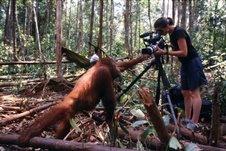Another Crude Oil?
A Cockroach Films Production in Association with BOS-USA & BOS-UK
Dir. Nick Lyon & Evania Wright
Sponsored by: the British Government, BOS-UK, Miller Tripods, KATA
bags, RODE Microphones & NickLyonMedia
A dense mist hangs over a verdant forested hillside. It is early and the dawn chorus of a gibbon pair can be heard in the distance. We see some movement in a high treetop – a flash of orange reveals the presence of a maroon leaf monkey. A blue haze mingles with the mist, our view widens and we see the source of this smoke. The level ground has been clear-cut and the only remaining forest is on the steep slopes. A river snakes through the smouldering desert carrying an endless line of tree trunks…
ORANGUTAN FILM PROTECTION PROJECT (OFPP)
In central Kalimantan, vast stretches of rainforest are being cleared to make way for palm oil plantations. Wild animals, including populations of orangutans, are finding themselves isolated in shrinking forest islands in the midst of inhospitable and dangerous terrain. It is the work of the dedicated BOS Nyaru Menteng team to relocate these animals before it is too late. But what is driving this encroachment on pristine forest?
Cockroach Productions have teamed up with the Balikpapan Orangutan Survival Foundation to document and raise awareness of the current environmental crisis in Indonesia. The exponential boom in palm oil trading is affecting tropical zone deforestation globally, and Indonesian logging and plantation expansion in particular. The film makers will explore the key issues of global market forces, and to follow these through to the effects on government policy. The film will explore the difficulties faced by local governments in fighting corruption as it pertains to plantation concessions and associated logging of high-value, slow-growth timber trees.
The OFPP will follow the rescue teams based in Nyaru Menteng in Central Kalimantan as they fight to relocate 400-600 orangutans from shrinking ‘forest islands’. Regulations on wildlife corridors have all too often been ignored. The cleared land presents a dangerous desert, particularly to predominantly arboreal species such as the orangutan. When the last trees are felled the animals fall at the mercy of chance. Hunters ignore bush-meat bans. The trade in endangered species is a high-risk, but high-profit, alternative to manual labour in situations where companies ignore minimum wage commitments.
“If we are to succeed to stop this slaughter, we need your help. We need to care for the victims... yes. But just as important, we need to launch a very intensive awareness campaign including radio, TV, newspapers…”
Lone Dröscher Nielsen, BOS Nyaru Menteng
The majority of wildlife documentaries often perpetuate an illusion of the pristine. The encroachment of roads, railways, aeroplanes, cities, and people is kept safely out of sight. We hope to highlight the increased contact between industrial society and natural environments as they rapidly fragment into isolated pockets. The overly comfortable position we can find ourselves in as we watch a beautifully crafted sequence of a gibbon brachiating through the tree tops might be shaken if we were allowed to hear the roar of chainsaws that had caused the gibbon to move.
This film will illustrate the overwhelming and hidden power of a product that some traders refer to as ‘liquid gold’. Vast quantities of palm oil are being extracted from oil palms farmed on unregulated and irresponsibly-run plantations. Eventually, oil palm produce and its derivatives arrive in our supermarkets, where, amazingly, it can be found in 10% of all products. The film will suggest strategies of developing a new consumer consciousness that rewards environmentally and socially responsible production of this wonder crop.
The Orangutan Film Protection Project will work in co-operation with environmental and humanitarian NGOs. It will raise consciousness of pressing issues. A boycott of products containing palm oil would be both impractical and socially irresponsible because there are many smallholders whose livelihood depends on the product. What we hope to do with the OFPP is develop a system whereby responsibly farmed palm-oil can be tracked through the market place and clearly labelled on products. Through the medium of film we hope to develop a consumer consciousness of these issues, and use purchase power to reward corporate responsibility. At Cockroach Productions we believe that the growing popularity of feature length documentaries in the box-office reflects a customer desire to consume information and develop a more acute and critical political awareness. With knowledge comes choice of action, and this is a powerful tool when sales dictate corporate strategies.
PALM OIL: LIQUID GOLD
What is this crop that is replacing vast tracts of pristine forest? Some facts about palm oil:
o Palm oil is the most productive of the edible oil plants per acrei
o Oil palm requires less pesticide, herbicide and fertiliser than other oilseed crops
o Oil Palm derivatives are present in 10% of supermarket products, from margarine, biscuits, confectionary, icecream and ready meals to soap, lipstick and paint
o 51% of global trade in edible oil relies on palm oilii
o From 1995 to 2002 palm oil usage in the European Union increased by 90%iii
So why is this seemingly environmentally friendly crop causing so much damage to Indonesia’s ecosystems?
PALM OIL: A SMOKESCREEN FOR LOGGING?
In 1998 the Chinese Government enforced a complete ban on logging of natural forests in the up-river regions of the Yangtze and Yellow River regionsiv. Between 1997 and 2000 China’s native timber production fell by 97%v. However, China is still producing vast quantities of wood products, twice the amount accounted for by official import records. China’s ban has solved local sourcing problems but has translocated the logging problem to illegal exports, mostly from Indonesia. Indonesia has encouraged foreign investment for palm oil production and has allocated vast concessions for its production. However, of the 8,000,000 ha. of land cleared for palm oil production in the last ten years, only 1,200,000 ha. have ever been plantedvi. It is clear that the legal concessions are being abused whereby valuable timber trees are logged and extracted via the black-market before the area is levelled. The land is then left bare in many areas. As well as having a devastating effect on the environment, this is a disaster for local people who don’t take a share in the profits of illegal activity. The local government loses vast potential tax revenues, both on the illegally exported logs and the undeveloped, clear-cut land. We hope to promote the future use of pre-cleared land and stop loggers acquiring new concessions to cut into pristine forest. There are vast tracts of land that could potentially be developed for their initial purpose – palm oil plantations. They lie as wastelands now, whilst virgin forest is destroyed.
THE NEXT STEP:
Another Crude Oil? is the pilot episode in a series of socioenvironmental documentaries. Cockroach Productions will work to inspire interest and action through the OFPP.
Ultimately we are hoping, with the help of BOS and the involvement of other major humanitarian and environmental charities, to produce a series of documentaries highlighting the immediate and serious threat that the palm oil trade is presenting to the rainforest in the Indonesian archipelago right now. Through the development of consumer awareness, we aim to encourage corporate responsibility in palm oil trading. As such we hope to protect the interests of local people and the forests that surround them.
Nick Lyon, OFPP, Cockroach Productions 17th January 2005
cockroachproductions@gmail.com
Photographic credits:
All primate photographs © Nick Lyon
All logging images courtesy of BOS-USA
i Jamie Grant (WWF) & Emma Duncan (WWF), People & the Planet: “Greening the palm oil industry could help save Indonesia’s forests”
ii Mielke, Oil World Annual 2003, cited in AIDEnvironment: “Palm Oil Production in Southeast Asia”
iii Friends of the Earth: “Greasy Palms – palm oil, the environment and big business”, page 10
iv D. Kaimowitz, International Forestry Review 5(3), 2003 page 205: “Forest law enforcement and rural livelihoods”
v Environmental Investigation Agency & Telapak Indonesia: “Timber Trafficking: Illegal Logging in Indonesia, Southeast Asia and International Consumption of Illegally Sourced Timber”
vi L. Williams, BOS-UK 2004: “Illegal Logging invites disaster, but meanwhile there is money to be made”








